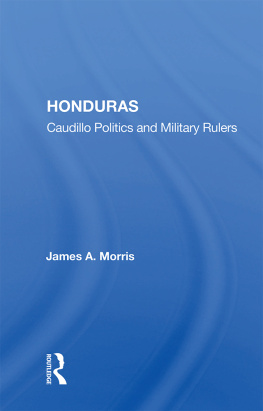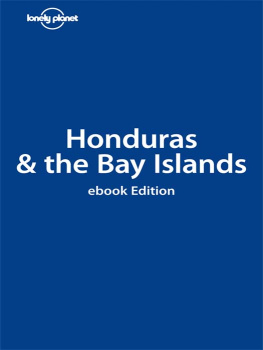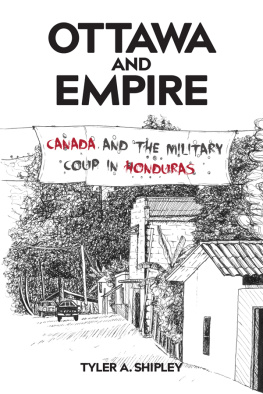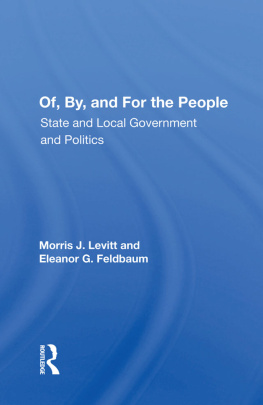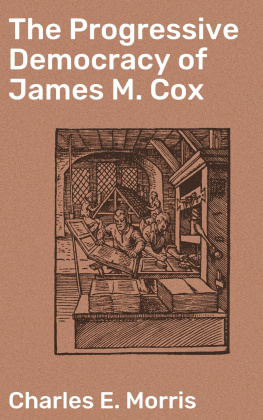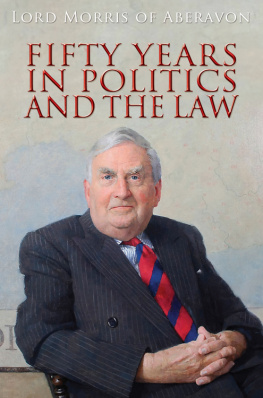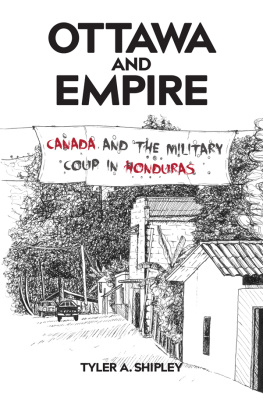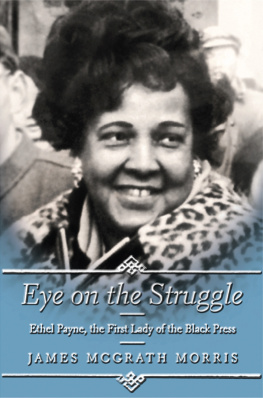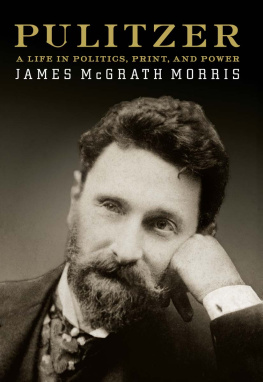HONDURAS
Westview Profiles Nations of Contemporary Latin America
Ronald M. Schneider, Series Editor
Honduras: Caudillo Politics and Military Rulers, James A. Morris
Mexico: Paradoxes of Stability and Change, Daniel Levy and Gabriel Szkely
Nicaragua: The Land of Sandino, Thomas W. Walker
The Dominican Republic: A Caribbean Crucible, Howard J. Wiarda and Michael J. Kryzanek
Colombia: Portrait of Unity and Diversity, Harvey F. Kline
Also of Interest
Latin America, Its Problems and Its Promise: An Interdisciplinary Introduction, edited by Jari Knippers Black
The Caribbean Challenge: U.S. Policy in a Volatile Region, edited by H. Michael Erisman
The End and the Beginning: The Nicaraguan Revolution , John A, Booth
Revolution in El Salvador: Origins and Evolution, Tommie Sue Montgomery
Revolution in Central America, edited by the Stanford Central America Action Network
Political Change in Central America: Internal and External Dimensions, edited by Wolf Grabendorff, Heinrich-W. Krumwiede, and Jrg Todt
The New Cuban Presence in the Caribbean, edited by Barry B, Levine
Available in hardcover and paperback.
Honduras
Caudillo Politics and Military Rulers
James A. Morris
First published 1984 by Westview Press, Inc.
Published 2018 by Routledge
52 Vanderbilt Avenue, New York, NY 10017
2 Park Square, Milton Park, Abingdon, Oxon OX14 4RN
Routledge is an imprint of the Taylor & Francis Group, an informa business
Copyright 1984 Taylor & Francis
All rights reserved. No part of this book may be reprinted or reproduced or utilised in any form or by any electronic, mechanical, or other means, now known or hereafter invented, including photocopying and recording, or in any information storage or retrieval system, without permission in writing from the publishers.
Notice:
Product or corporate names may be trademarks or registered trademarks, and are used only for identification and explanation without intent to infringe.
Library of Congress Cataloging in Publication Data
Morris, James A., 1938
Honduras: caudillo politics and military rulers.
(Nations of contemporary Latin America)
Bibliography: p.
Includes index.
1. HondurasPolitics and government1933
2. Civil-military relationsHonduras. 3. Honduras
Armed ForcesPolitical activity. 4. Honduras
Economic policy. I. Title. II. Series.
F1508.M67 1984 322'.5'097283 83-21789
ISBN 13: 978-0-367-01872-6 (hbk)
DEDICATED TO MY PARENTS
Alvin Francis Morris
Lorraine Elizabeth Morris
Contents
, Ronald M. Schneider
Guide
Recent experience has taught us that just because a country such as Honduras is small and has never played a major role in hemisphericmuch less globalaffairs, we cannot assume that it is unimportant. Brazil, Mexico, Argentina, and Colombia notwithstanding, most of the countries of Latin America are small and with little weight in international affairs. Indeed, this is the case with a decided majority of the world's countries. Then, too, Honduras has been overshadowed because it is located between Central American countries that enjoy greater prominence for one reason or another: Guatemala on the north, larger and scene of a turbulent revolutionary experience between 1944 and 1954; Nicaragua to the south, locale of a controversial ongoing revolution; and El Salvador on the west, racked by protracted civil war. To the east lies the Caribbeanitself scarcely a sea of tranquillity. Given Honduras's location and the ever-increasing U.S. presence there, the world will certainly hear much more of this nation and its people in the years immediately ahead.
James Morris knows and understands Honduras as do very few persons who have not spent their lifetimes there. His book not only puts the country in comparative perspective but also demonstrates how contemporary military regimes have roots in the caudillismo of earlier eras. As with the other studies in this series, this volume is an interpretive essay even more than a compendium of relevant information. It portrays a society undergoing change on many fronts, albeit limited in rate and extent; an essentially agrarian economy that supports a growing urban service sector on a precariously limited industrial base; and a political system riddled with contradictions between partially undermined traditional institutions and processes and as yet extremely fragile and oftentimes rootless features of a modern party and interest-group in-frastructure.
The author's approach is basically that of cultural relativism tempered with a residual pluralist democratic orientation, and his most important analytical concept is that of the "cycle of political frustration" as a pattern repeated several times during a slowly ascending developmental experience. This is now aggravated by the political polarization of Central America between Marxists and authoritarian conservative forces, so the next cycleperhaps already under waywill be complicated by the end of Honduras's relative international remoteness, with Central America a cold-war cockpit rather than a backwater region. Morris's study leaves the reader well prepared to comprehend the critical events of the mid-1980s in the center of Central America.
If in this book culture receives little attention relative to other books in this series, it is because there is far less that is distinctive or of note in this sphere of Honduran national life. By way of contrast, international affairs, particularly relations with other Central American countries, are treated in detail, a fact of great importance since the Reagan administration has clearly chosen to make Honduras into the major U.S. military base in the area. Indeed, it is this small country's fast-growing role as a base for operations against the Sandinista regime in Nicaragua and for training of El Salvador's military that makes Professor Morris's well-informed study a particularly timely and significant addition to the Nations of Contemporary Latin America series.
Ronald M. Schneider
In the classic 1950 study by William S. Stokes, the Republic of Honduras is described as having a highly centralized political structure based on authoritarian propensities and personalistic modes of individual and societal relationships. Despite a variety of changes that have transformed the society, centralization, authoritarianism, and personalism remain as primary characteristics of Honduran society and politics. Caudillismo, or political bossism and strong-man rule, has, in some aspects, been followed by the predominance of military rule. Even so, traditional social and political values have perpetuated the concept that control over the state and appropriation of its resources are legitimate means of social mobility or personal gain. It is questionable whether the "ventures of successful pillage" led by the caudillos (the political bosses) of old and the corruption that has accompanied military rule are functionally different or whether new social and institutional conditions have merely determined a new technique.
Continuity of the political order has been preserved, but both old and new elites must now contend with aspects of social, cultural, economic, and political changeall part of rapid modernization and socioeconomic development. Through decades of national fragmentation, dictatorship, institutional weakness, and the consolidation of military rule, elements of traditional caudillo politics have persisted and survived. It is doubtful, however, whether continued military political dominance will provide the institutional formula Hondurans need to forge the consensus required to address the nation's social and economic problems. Both these taskspolitical consensus and national developmenthave been influenced greatly by global and regional phenomena, especially the unfolding crisis in Central America.


